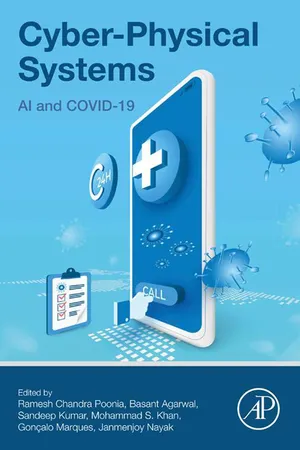
Cyber-Physical Systems
AI and COVID-19
- 278 pages
- English
- ePUB (mobile friendly)
- Available on iOS & Android
Cyber-Physical Systems
AI and COVID-19
About This Book
Cyber-Physical Systems: AI and COVID-19 highlights original research which addresses current data challenges in terms of the development of mathematical models, cyber-physical systems-based tools and techniques, and the design and development of algorithmic solutions, etc. It reviews the technical concepts of gathering, processing and analyzing data from cyber-physical systems (CPS) and reviews tools and techniques that can be used. This book will act as a resource to guide COVID researchers as they move forward with clinical and epidemiological studies on this outbreak, including the technical concepts of gathering, processing and analyzing data from cyber-physical systems (CPS).
The major problem in the identification of COVID-19 is detection and diagnosis due to non-availability of medicine. In this situation, only one method, Reverse Transcription Polymerase Chain Reaction (RT-PCR) has been widely adopted and used for diagnosis. With the evolution of COVID-19, the global research community has implemented many machine learning and deep learning-based approaches with incremental datasets. However, finding more accurate identification and prediction methods are crucial at this juncture.
- Offers perspectives on the design, development and commissioning of intelligent applications
- Provides reviews on the latest intelligent technologies and algorithms related to the state-of-the-art methodologies of monitoring and mitigation of COVID-19
- Puts forth insights on how future illnesses can be supported using intelligent corona virus monitoring techniques
Frequently asked questions
Information
Table of contents
- Cover image
- Title page
- Table of Contents
- Copyright
- List of contributors
- Chapter 1. AI-based implementation of decisive technology for prevention and fight with COVID-19
- Chapter 2. Internet of Things-based smart helmet to detect possible COVID-19 infections
- Chapter 3. Role of mobile health in the situation of COVID-19 pandemics: pros and cons
- Chapter 4. Combating COVID-19 using object detection techniques for next-generation autonomous systems
- Chapter 5. Non-contact measurement system for COVID-19 vital signs to aid mass screening—An alternate approach
- Chapter 6. Evolving uncertainty in healthcare service interactions during COVID-19: Artificial Intelligence - a threat or support to value cocreation?
- Chapter 7. The COVID-19 outbreak: social media sentiment analysis of public reactions with a multidimensional perspective
- Chapter 8. A new approach to predict COVID-19 using artificial neural networks
- Chapter 9. Rapid medical guideline systems for COVID-19 using database-centric modeling and validation of cyber-physical systems
- Chapter 10. Machine learning and security in Cyber Physical Systems
- Chapter 11. Impact analysis of COVID-19 news headlines on global economy
- Chapter 12. Impact of COVID-19: a particular focus on Indian education system
- Chapter 13. Designing of Latent Dirichlet Allocation Based Prediction Model to Detect Midlife Crisis of Losing Jobs due to Prolonged Lockdown for COVID-19
- Chapter 14. Autonomous robotic system for ultraviolet disinfection
- Chapter 15. Emerging health start-ups for economic feasibility: opportunities during COVID-19
- Index